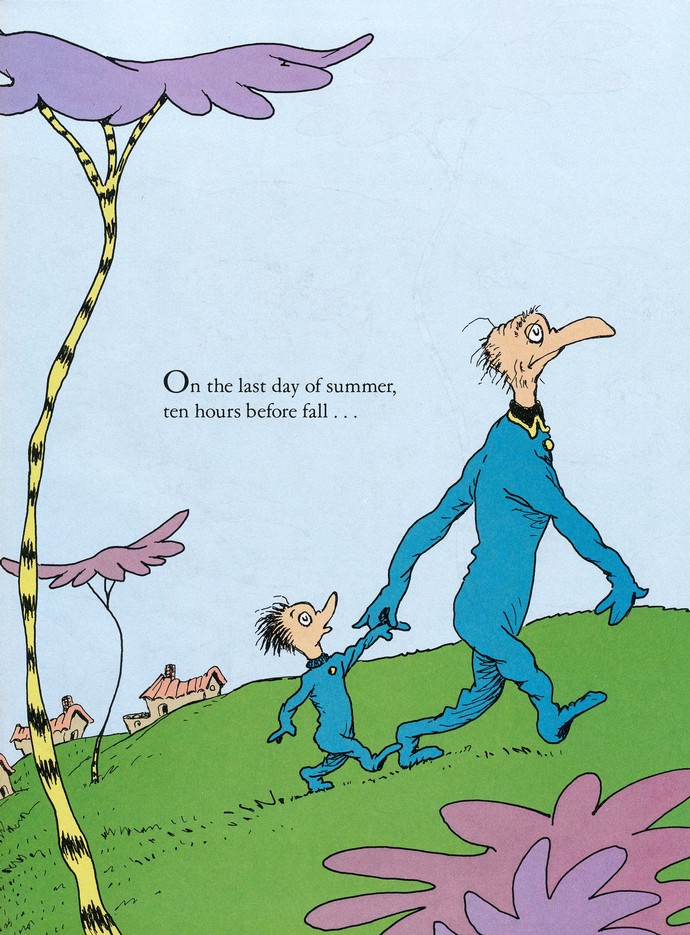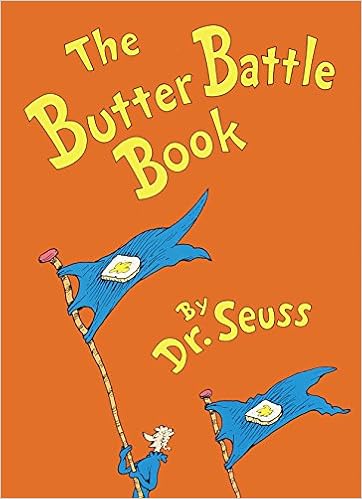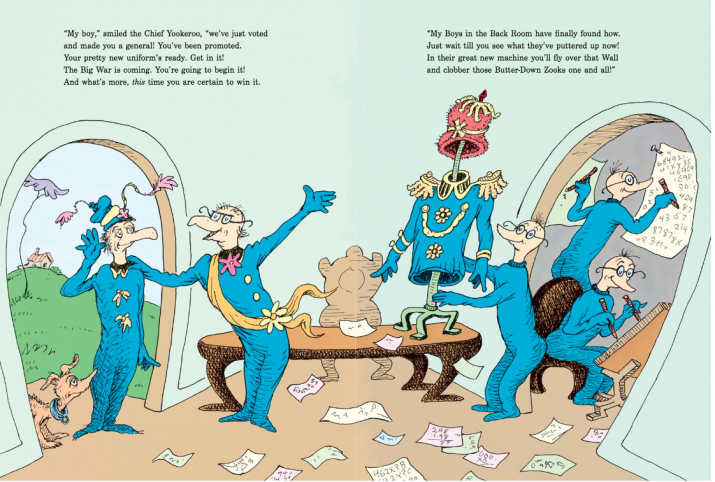Yes, such a book does exist! In 1984 Dr. Suess published a book aptly titled, “The Butter Battle Book”. On the surface, the book follows a disagreement between the Yooks, who have their bread butter side up, and the Zooks, who have their bread butter side down. Although taking a closer look, the book is meant to represent the arms race during the Cold War between the United States and Russia.

It started out with small weapons such as catapults, but as the book goes on the weapons become more and more dangerous. If one side feels threatened, they bid a hasty retreat, then quickly return with a weapon even more lethal.

The last time the narrator is seen to visit the chief and the boys, both are hiding in the back room, the door now closed. The chief hands the narrator a small object called the “Bitsy Big Boy Boomerro”, which is a bomb to use on the Zooks. The next page shows all of the blue Yooks lining up and going single file down into a hole in the ground. This closely resembles American citizens preparing for nuclear war and going into bomb shelters.
The reader is taken back to “present day” when the narrator is no longer the grandfather, but the grandchild. We learn that the grandfather still has possession of the bomb, and that he is preparing to drop it.
He goes up onto the wall and is met with a Zook who also has a similar looking bomb. Both stare at each other, as if daring the other to drop it. The book ends with the two at a stalemate, similar to how the Cold War ended.
https://theoutline.com/post/5601/dr-seuss-the-butter-battle-book-history?zd=1&zi=uitiljr2 https://www.shmoop.com/butter-battle-book/meaning-2.html
https://www.youtube.com/watch?v=ut1CSRmVp0I




I enjoyed reading this post especially because I remember reading this book when I was little. I definitely did not catch the Cold War reference that Doctor Seuss was making and it is interesting to see in your post how things related back to the Cold War. I liked how you also included pages from the book as it allowed the reader to see the correlation that the events in the book had to do with the Cold War. Your post made me think about other books that Doctor Seuss has published and usually how they have a deeper meaning behind them. A book that comes to mind is the Lorax, a pro environment book that shows the dangers that happen when harming the environment.
ReplyDeletehttps://theoutline.com/post/5601/dr-seuss-the-butter-battle-book-history?zd=1&zi=lbtovb2w
I really liked your blog post, it was intriguing and I have read many Dr. Seuss books in the past so this seemed familiar. I like how you explained both the story of the book, and referenced back to how this connected to the Cold War; your images were also very helpful in allowing the reader to follow you as you narrated. In addition to this book, Dr. Seuss had also written "Yertle the Turtle", which was a story about a turtle who demanded others to lift him up so he could be at the highest point in the sky. When he realizes the moon is still taller than him, he declares the need for more turtles but comes toppling down; Dr. Seuss used this book as a representation of Hitler.
ReplyDeletesources - https://www.mentalfloss.com/article/28843/stories-behind-10-dr-seuss-books
I found it super interesting in how a lot of American propaganda during the cold war was also directed towards kids in the form of children's books. Something I wanted to look at was propaganda aimed at children on the soviet side of the cold war. On such example was The Bolshevik Hedgehog, in which a tyrannical boar prevented a group of animals from playing football. Following an uprising, the group of animals, led by the hedgehog, marched towards victory. Another story, The First of May, follows a soviet family as they walk to the park. As they walk, the marvel at the Soviet technology and their superiority.
ReplyDeletehttps://www.rbth.com/arts/329187-playful-propaganda-early-soviet-childrens-books
This was a really fun post to read because I knew that Dr. Seuss was active in some political satire but I did not realize that it got to this level. It is funny to think that he portrayed the Cold War through these little fictional characters, but it is an exact portrayal of what the Cold War looked like. It was fascinating to me that each side kept getting better weapons and getting into bigger danger and eventually a stalemate. Very well written.
ReplyDelete